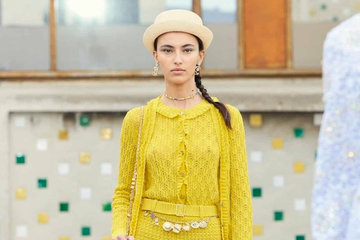
Shahd Alasaly
While founding Blue Meets Blue, a Chicago-based fashion line known for its select, high quality, sophisticated pieces, Shahd Alasaly wanted to create a brand with an ethical element to the heart of her project. Once she found out the world is facing the biggest refugee crisis since WWII, Alasaly felt employing some of the many female refugees who have fled to the USA in search of a better future was the natural choice. She partnered with local resettlement agencies to help find work for those who have skill sets like beading, pattern making and sewing so they could be an essential part of the creative process that goes into making the luxury couture and ready-to-wear pieces.
By providing the refugees with jobs, which subsequently help foster empowerment and hope, Alasaly, along with her incredible team, is essentially helping them help themselves. She is also enabling them to do something they’re passionate about. What’s more, the name Blue Meets Blue signifies the blue of the ocean meeting the blue of sky, the perfect example of endless freedom and connectedness.
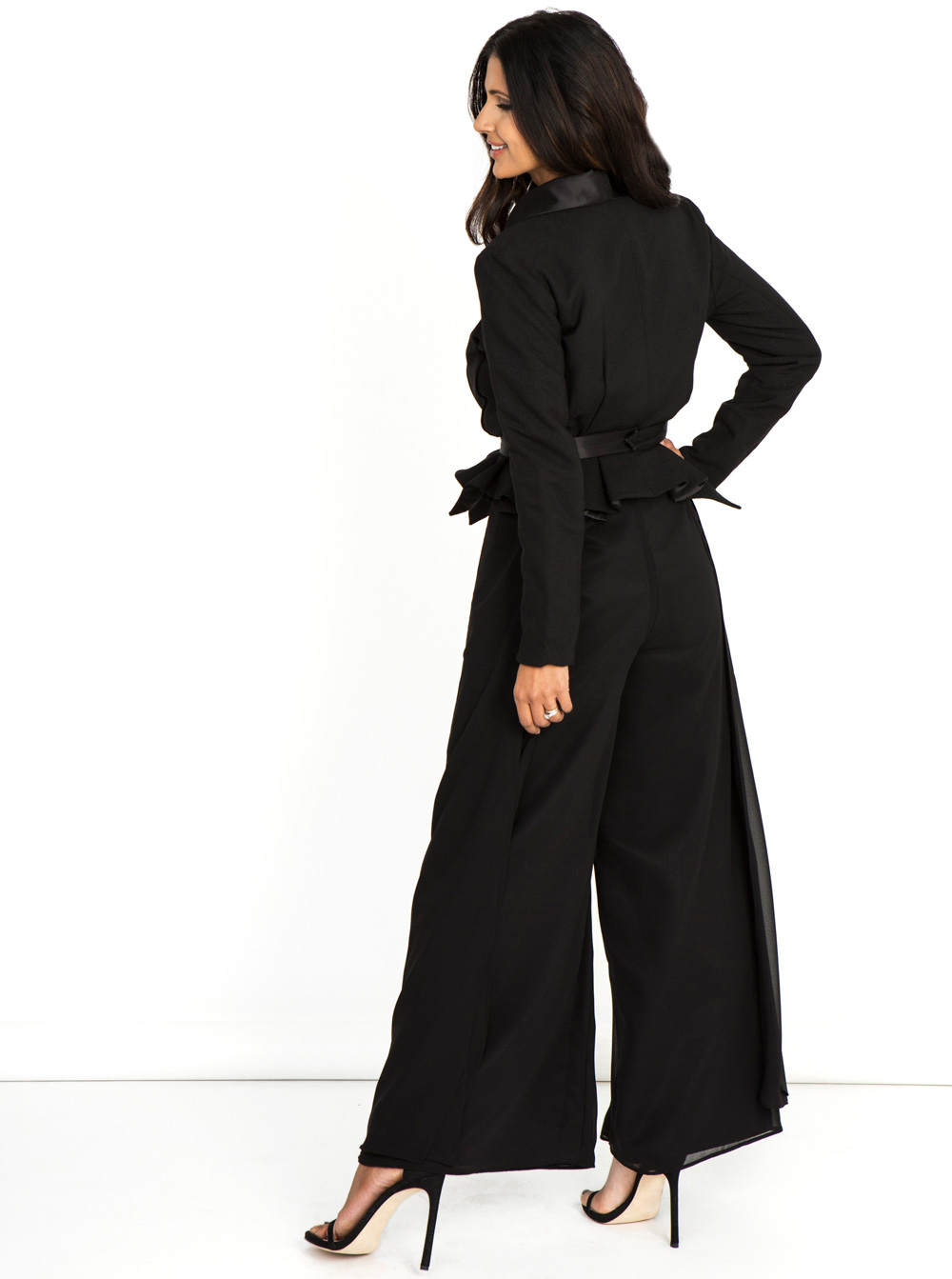
We chat to Alasaly, who has a background in fashion and psychology, about how the modest trend fashion is growing in the US, embedding social impact into today’s business models and her favourite designers. We also ask her why she feels Dubai is the perfect place for Pret-A-Cover Buyers Lane, a revolutionary modest fashion event.
Tell us a bit about yourself.
I was driven to found and launch Blue meets Blue after I learned we were in the midst of the largest refugee crisis since World War II. My heart told me I had to get involved, so I combined my Master’s in International Psychology, much of which was spent in Syria, with my family’s tradition of sewing and designing our garments. I launched a label that would go out and find skilled workers to employ them, connect them and help them transition.
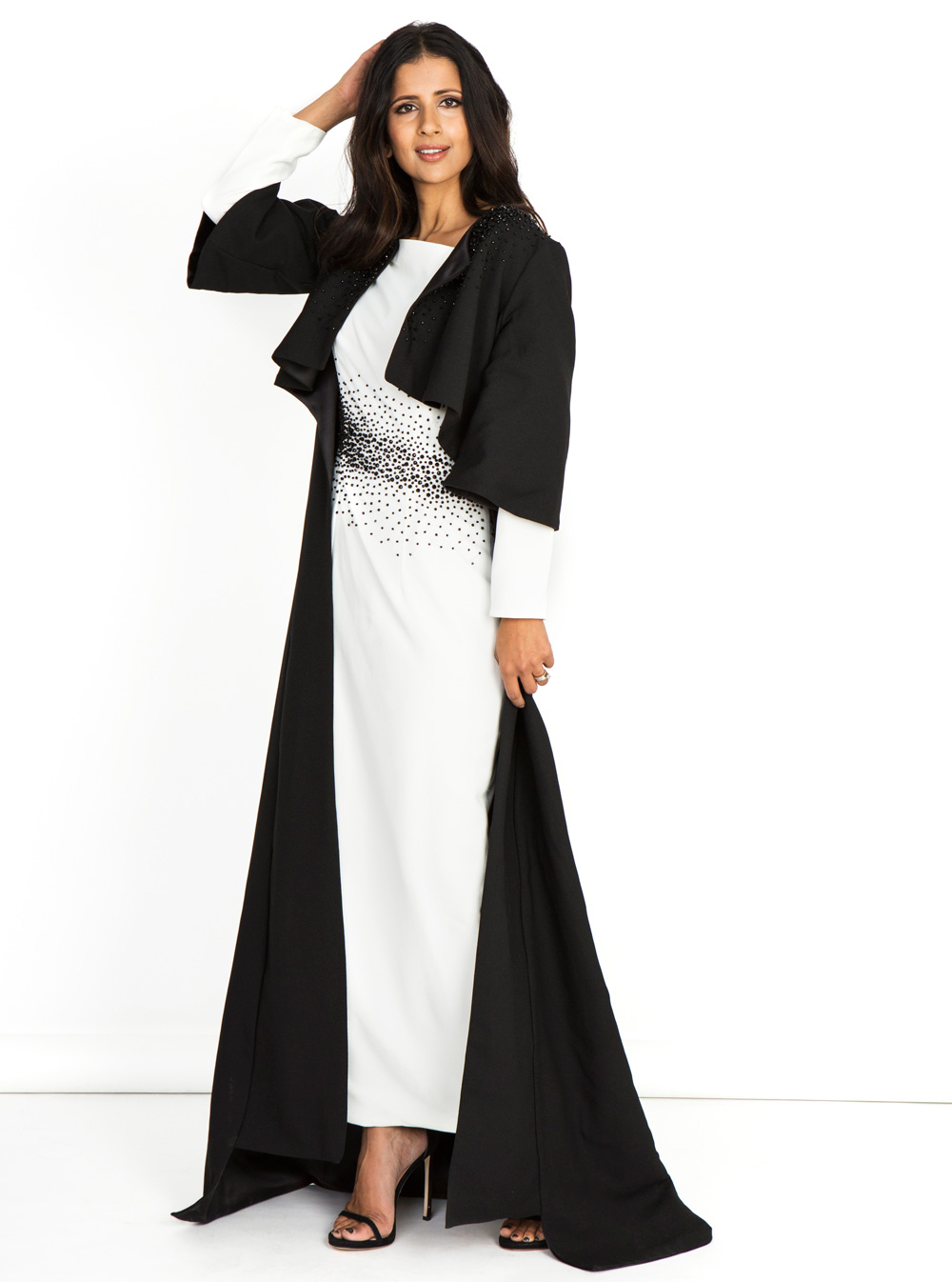
Modest fashion has been described as one of the most important trends of our decade. You work in the US, how have you seen this trend grow? Where do you see it going?
Our offices are in Chicago, but our network spans the US, Middle East and parts of South America. From word-of-mouth alone, I can see modest fashion is pervasive and growing. If you simply look to Google, you’ll find research showing the number of searches for “modest fashion” alone is also increasing, which tells me newcomers to the “trend” want to learn more, and the women who have always worn modest fashion are making a point to find it on a local level.
Retailers are onto this, and the number of queries we’re getting from them is starting to jump. We’re proud to be at the forefront of American demand, while serving a humanitarian purpose at the same time.
As far as what’s next for modest fashion, I think there’s going to be heightened awareness in America for what it is and hopefully more education around it, too. We all perceive modest fashion in our own ways. Some people dress modestly out of religiosity. Others just find it aesthetically appealing and empowering.
In America we have many different religious groups that are looking for modest clothing.
What’s important is people are de-stigmatising the idea that modest clothing has to be unflattering. The reality is it’s quite the opposite, modest fashion has become vibrant and supremely stylish.
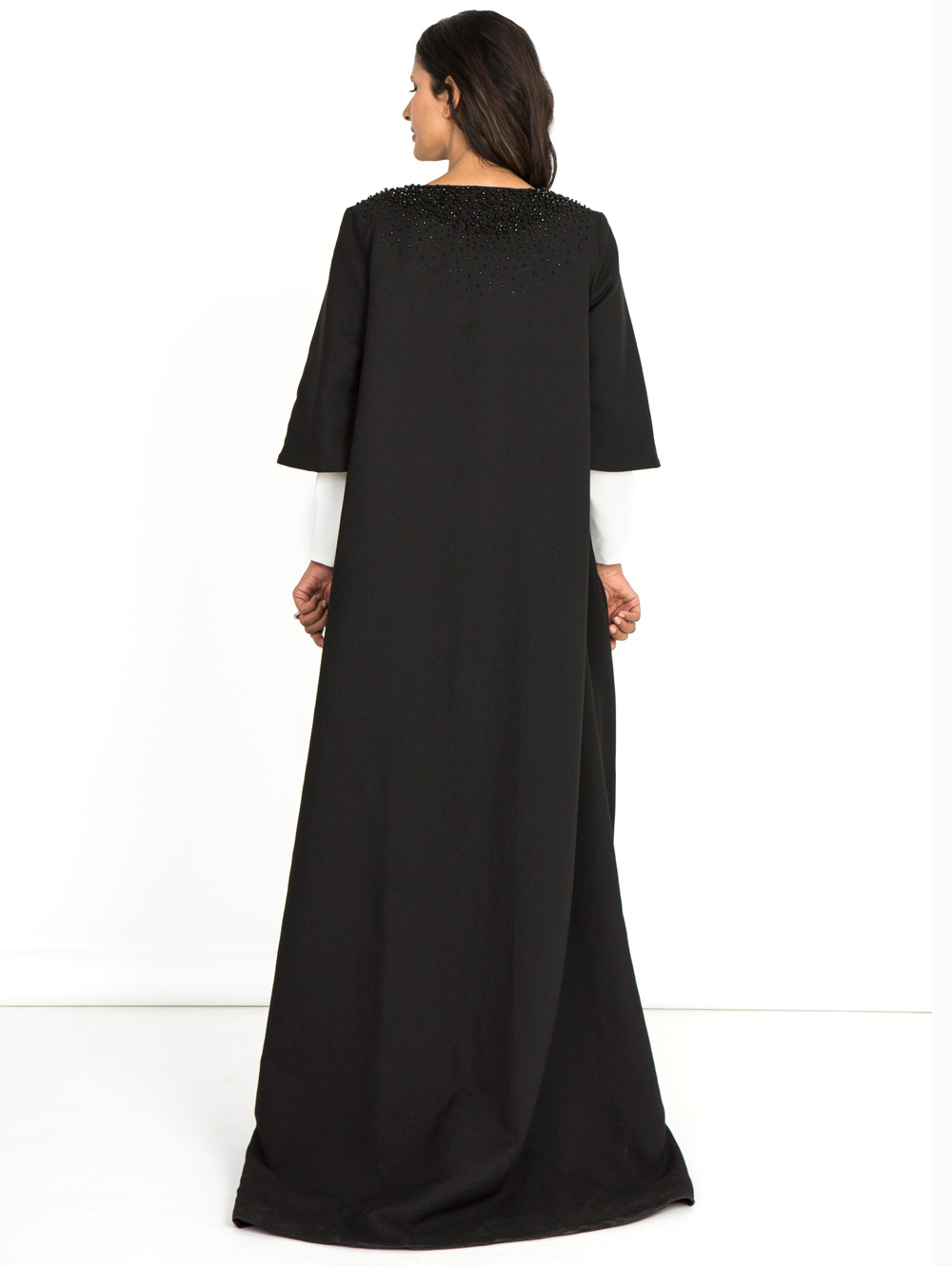
Blue Meets Blue's motto is ‘Where fashion meets humanitarian’. How did the label come about?
I was completing my Master’s in International Psychology when I founded Blue Meets Blue. My thesis was on working with refugees after arriving to their new country. Given my background as a Syrian-American, the refugee crisis particularly hit home for me. I felt a desperate urge to do something that made a difference, and I also wanted to focus on combining my background in design and psychology. Our motto, “where fashion meets humanitarianism,” is the backbone of our company and the vision I had for it. We set out to make a real difference for people, and I hope it inspires others to believe that whatever your industry, you can make an impactful difference.
As consumer behaviour is shifting and with millennials entering the workplace, more and more companies are forced to look into embedding social impact into their business models. Blue Meets Blue employs refugees in the USA. How do you think this model is affecting your business results?
Most definitely, millennials are known to be the generation standing up for humanitarian issues and human rights. Industries are making that change because they realise their consumers won’t support as strongly if they’re not contributing to a greater cause.
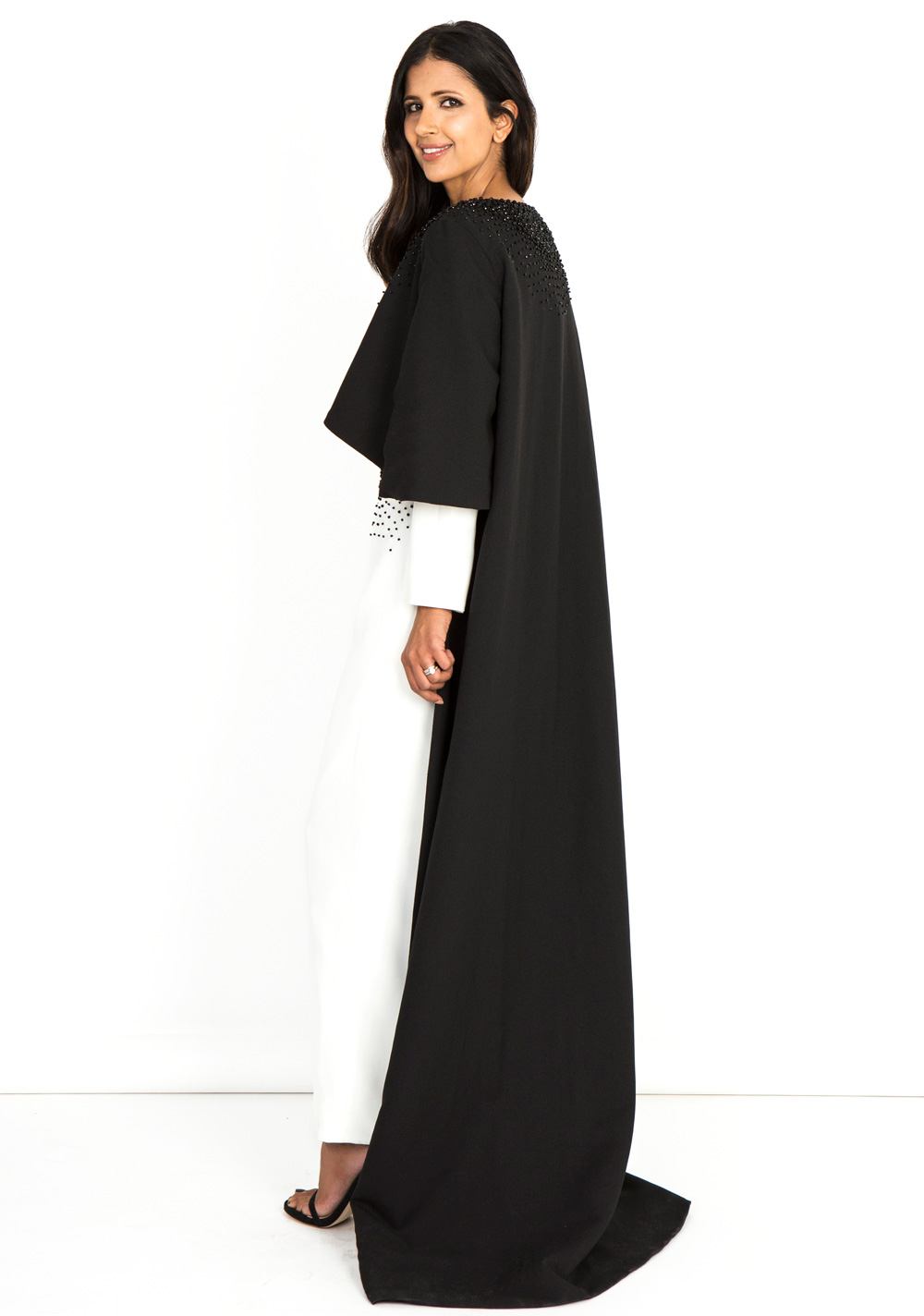
Who are the designers or business people who inspire you?
Tory Burch, she is a powerful female designer who is also very inspirational in what she does for other women through her foundation. She is the perfect balance of fashion designer, philanthropist and powerful businesswoman.
Who is your favorite contemporary fashion designer (well-known or up and coming)? Who are the designers / brands that inspire you?
There are so many INCREDIBLE designers like Ziad Nakkad, Ali Younes, Georges Hobeika and Saiid Kobeisy, who scream inspiration.
My personal taste in fashion always pulls me towards couture garments, anything that is beautiful and loud.
At a time of ‘fast fashion’, modest fashion seems to counterbalance the act and be less seasonal, more timeless. Do you embrace current trends? How do you incorporate them within your modest designs?
We can embrace current trends, so long as it fits in our slow fashion production cycle. Blue Meets Blue does not celebrate fast fashion, though. It goes against our personal ethos about the environment and treatment of workers. Instead, we make a point to incorporate new ideas and designs into collections, which can be worn year-round and are timeless.
For example, our “Zahra" high-low cape is a riff of the high-low trend that came out seasons ago, yet sits beautifully in our collections, and our customers love it.
Our entire business is built on serving and helping others, and I think that message resonates with a lot of our consumers. Not only are people able to purchase high quality luxury fashion, but they know their purchase directly benefits refugee artisans, which makes the transaction all the more meaningful. This path for us has been difficult in the early years, but it’s incredibly rewarding, especially as we see quarterly sales increases.
What is your favourite piece from your last collection?
The “Dania 2.0” is my current favorite. It’s a dramatic pant skirt with satin lining and crepe exterior. I actually saw it all over the Golden Globes, and the UK’s “Daily Mail” featured it alongside their round up of actresses who wore it on the red carpet.
I love it because it’s a power piece and incredibly sophisticated. I wear the “Dania 2.0” with kitten heels, beaded necklace and a sleek silk blouse tucked in.
Are fashion and culture connected? How so?
Absolutely, the two are intertwined and cannot be separated. Fashion is a reflection of culture. There is a reason we see billowing silhouettes and maxis on the runway shows. Can you guess what that is?
What is your motto in life?
Your only limit is you. Eyes forward, mind focused, heart ready… game on world.
Why do you think Dubai is the perfect place for the revolutionary Pret-A-Cover Buyers Lane?
Dubai itself is revolutionary, so what other city than this one for the Pret-A-Cover?
Also, women in Dubai make a point to shop for modest fashion, so hosting a modest fashion show that serves the demand there is a much-needed opportunity for Blue Meets Blue and the other attending designers. We’re coming in from all over the world to be part of this and are grateful for the opportunity.

Blue meets Blue will be participating in the Pret-A-Cover Buyers Lane, the leading revolutionary event dedicated to modest fashion. The event is taking place at Dubai, City Walk 2, from March 28 to April 2. To RSVP, click here: https://www.ifdcouncil.org/attendee-sign-up/

